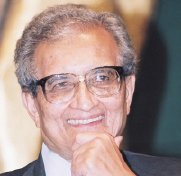Note: this interview was broadcast on WGBH Radio. And here’s a PRX review of the program!
 Amartya Sen, the distinguished economist, philosopher, Nobel laureate and Harvard professor, talks with ThoughtCast about “Identity and Violence: The Illusion of Destiny.”
Amartya Sen, the distinguished economist, philosopher, Nobel laureate and Harvard professor, talks with ThoughtCast about “Identity and Violence: The Illusion of Destiny.”
This new book examines the unfortunate connection between violence and our tendency to identify with one key trait — our ethnicity, or religion, for example — to the exclusion of all others. Sen argues that we can combat this tendency by rejecting this narrowly defined, limited sense of identity, and embracing a broader, richer and more complex understanding of ourselves.
Amartya Sen was born in West Bengal, India (now Bangladesh) and teaches economics at Harvard University. He is known in the wider world for his work on the causes of famines.
Note: Susan Wennemyr served as associate producer on this program.
Click here:  to listen (28:30 minutes).
to listen (28:30 minutes).
To listen to a panel on “Combating Global Poverty” that includes Sen, click here to access WGBH’s Forum Network.
Podcast: Play in new window | Download
Subscribe: RSS

Hindu religion unlike Christianity or faiths that have a religious text is quite fluid and Sikhism which believed in monotheism and did away with the caste system and so did Brahmo faith which happened alongside Unitarian movement in England and New England (America). A religion has to be as fluid as times for it to survive.
This coming from an agnostic.
Priyadarshi Datta, Phd
This is in response to the issue raised by Dr. R. D. James. I do agree that caste as it is now, is a menace to Indian society. However, i disagree that Hindu religion sponsors it. In fact, there are numerous stremas of thought which have been clubbed into the one term- Hindu religion. In fact, the agends of Hindutva has done irreparable loss to Hinduism as a philosophy by giving way to such simplistic and conservative definitions of and assumptions about Hinduism. The term ‘Hindu’ itself was coined much after the philosophy found its genesis in Vedas. And then through millennia, what is now called Hinduism has evolved into a conglomeration of several modes of behaviour, faiths, beliefs, practices. However, what is underlying Hindu philosophy is the faith that ‘something beyond matter exists’. I am a Hindu and yet not a Hindu in the rigid sense of the term it is used by Dr. James. I also think it’s a query if caste has penetrated Islam and christianity from Hinduism. No such simplistic notions deserve to be stated in paucity of evidences. Society evolves and degenerates, and then evolves; same with religions. They have their own trajectories, of course, they draw upon and reject, mingle and separate from each other. In spite of objections to Dr. James’ simplistic assumptions, i appreciate his understanding that caste is now a menace to Indian society, and so would like to motivate Indians to “GIVE UP THEIR CASTES”. This is now an obsolete institution.
The man is a genius, I just hope our leaders get a free copy of his book. Once in a while someone comes up with a book that opens our eyes to the reality of our situation and we can either look the other way, or take these views to heart. This interview demonstrates what I have always believed to be the root of the world’s problem, and that is almost all of us believe that we are so different in many ways that there is absolutely nothing we have in common. Will someone give this guy a second Nobel prize? He certainly deserves it.
the hindu caste system is a blot and a curse on India, humans in general. the hindu religion, temples sponsor this system and has infiltrated other religions as christianity Islam etc. my writing to hindu leaders has drawn a blank. the media can help us. Any suggestion to fight this evil thanks
The multiple identity an individual or civilisation carries is undeniable but that does not contradict the underlying theme of what Huntington has propounded so brilliantly. Will Sen kindly inform as to why the Hindu and Buddhist minorities have been declining in number rapidly in his native Bengal now called Bangladesh — an Islamic country for all practical purposes — 29% at partition in 1947 to 8% currently. Can he tell us as to why that part of Asia, which was one of the cradles of Indian/Bengal Renaissance and an important theatre of indian freedom movememt has turned into a hotbed of Jihadi terrorsim? If he could tell us how many roads of Dhaka, where he was born, has roads named after Poet Tagore? Only if he can kindly answer these simple questions, I might ask him more on as to why and how one identity submerges the previous ones ?
Thanks for dropping by The Sound Palette! All the best.
The interview with Amartya Sen was an informed and thought-provoking discussion. The idea that ‘should’ is the key word in relation to ethics I found to be revelatory and challenging as far as human behaviour is concerned. Mr Sen spoke with hope that the human condition can free itself from the chains of economic enslavement and overcome that which divides us. A pragmatic open-minded discussion which all of our political masters would be served by listening to. i look forward to future programs.